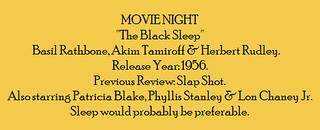
Review #1179: The Black Sleep.
Cast:
Basil Rathbone (Sir Joel Cadman), Akim Tamiroff (Udu the Gypsy), Herbert Rudley (Dr. Gordon Ramsay), Patricia Blake (Laurie Munroe), Phyllis Stanley (Daphnae), Lon Chaney Jr. (Dr. Munroe aka Mungo), John Carradine ("Bohemund"), Bela Lugosi (Casimir), and Tor Johnson (Mr. Curry) Directed by Reginald Le Borg.
Review:
With horror films, there surely is an expectation for terror and suspense with some sort of capable cast of characters to make something worth watching as entertainment. With this film, that statement isn't too particularly true, since the only thing that drives the film is its cast. It has an occasional shocking moment or two, but there isn't enough energy present in its story to make something other than just a fairly forgettable piece in a decade filled with films with frights and schlock that stand out much clearer. When the most interesting thing to view is one shot of an exposed brain seeping cerebral fluid (second place going to Rathbone's hand double used for the surgery being an actual neurosurgeon), perhaps your movie needs a bit more noteworthy things to go around. Undeniably, the one thing that does shine above all else for this feature is Rathbone, who manages to give his role a fair bit of dignity that goes past being just the madman scientist who values results over things such as not operating on living patients and their brains, balancing a bit of tragedy with scientific ambition. Alas, not even he can save this film from falling into the world of blandness. Perhaps the story from Gerald Drayson Adams and screenplay by John C. Higgins (both of whom were mostly writers for adventure or mystery films) is to blame a bit. The dilemma involving the use of live brains would probably work better for a film with a bit more action to it, or at the very least would work better in a film that had a more compelling second lead than Rudley. He isn't too particularly interesting, and his chemistry with Blake is cursory at best, so there isn't too much driving drama (or much suspenseful horror, for that matter) besides occasional moments with Rathbone until the climax. It doesn't help that Chaney is tasked to simply growl, either. Lugosi appears in the film, although he has no spoken lines. Sadly, this was the last film of his to be released during his lifetime, as Lugosi died on August 16, 1956, just two months after the film's premiere. Tamiroff, playing a role originally intended for Peter Lorre (prior to disputes over salary rates) is alright, but he falls into the background for a good chunk of it. When the film finally decides to arrange an ending, what better way than to have Carradine chew a bit of scenery as a character who believes he is a legendary crusader from the 11th/12th century? It may be a bit ridiculous to see him (along with Johnson and another actor playing people affected by the brain surgery) run amuck on the people doing the experiments, but at least it is something to give the film a bit of a jolt, even if it is a bit on the over-the-top side, what with Carradine chanting "Kill!" and all. On the whole, it isn't a terrible experience, and the 82 minute run-time isn't too interminable to go through, but it really is only worth it for people willing to look past the lack of suspense and look more at the atmospheric moments and a fairly game performance from Rathbone. I don't think that the film does enough to prove a winner, but it is at the least a curious little horror film that serves its purpose better than some other horror films of its time (such as The Beast of Hollow Mountain (1956) for example), so take it for what it's worth.
Overall, I give it 6 out of 10 stars.

No comments:
Post a Comment